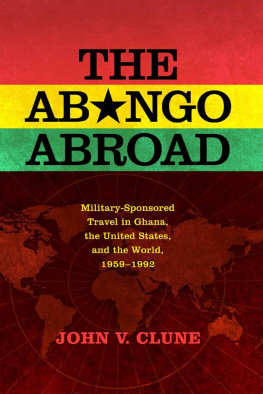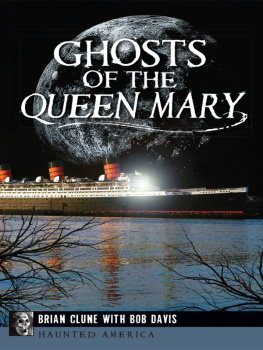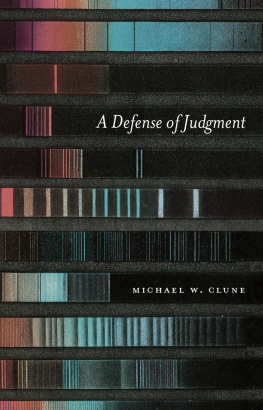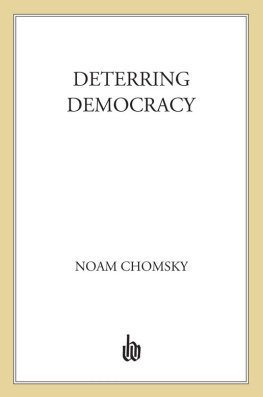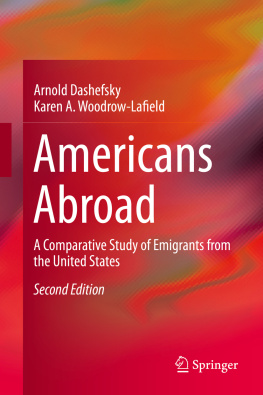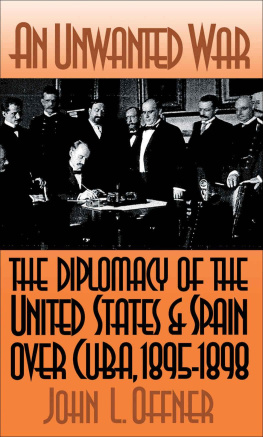THE ABONGO ABROAD
THE COLD WAR IN GLOBAL PERSPECTIVE
aims to publish innovative books that combine methods of political and cultural history; utilize previously untapped materials from foreign archives; and make significant contributions to the historiography of the social and cultural aspects of the Cold War.
PHILIP E. MUEHLENBECK, SERIES EDITOR
The Abongo Abroad: Military-Sponsored Travel in Ghana, the United States, and the World, 19591992, by John V. Clune (inaugural volume, 2017)
THE ABONGO ABROAD
Military-Sponsored Travel in Ghana, the United States, and the World, 19591992
JOHN V. CLUNE
Vanderbilt University Press
Nashville
2017 by Vanderbilt University Press
Nashville, Tennessee 37235
All rights reserved
First printing 2017
This book is printed on acid-free paper.
Manufactured in the United States of America
Library of Congress Cataloging-in-Publication Data
LC control number: 2016042796
LC classification number: UA695.G4 .C58 2017
Dewey classification number: 355.09667dc23
LC record available at lccn.loc.gov/2016042796
ISBN 978-0-8265-2151-4 (hardcover)
ISBN 978-0-8265-2153-8 (ebook)
Contents
Acknowledgments
As all historians know, works of history are community efforts. Thanks go to Phil Muehlenbeck, who invited me to share his vision for a Social History of the Cold War, and Eli Bortz, who shepherded me through the process. I thank my colleagues and professional advisors, including Anton Rosenthal, Elizabeth MacGonagle, Marie Brown, Brent Steele, Holly Goerdel, and especially Sheyda Jahanbani, for carefully guiding this project in reasonable ways without dampening my enthusiasm. At the University of Kansas, Beverly Mack, Theodore Wilson, Jeffrey Moran, Jennifer Weber, Yacine Daddi Addoun, and Robert Schwaller encouraged me as a scholar and friend more than they know. Colleagues Edward Woodfin, Edward Kaplan, Grant Weller, and Mark Grotelueschen generously offered their timely, sage advice. Librarians Carmen Orth-Alfie and Sara Morris provided rapid assistance whenever I called. Special thanks to Alan Clune and Amanda Schlumpberger for their countless hours editing and clarifying my work.
Thanks to the US Air Force Academys Department of History, especially Mark Wells, for sponsoring the fellowship that began this project, and the Air Force Institute of Technologys Civilian Institution section for administrative support while researching. The views expressed in this book are my own and do not reflect the official policy or position of the United States Air Force, the Department of Defense, or the US government. I thank the US Air Force Academys Directorate of Education, which sponsored my research in Ghana, and Brian Bartee, the US Air Force attach who coordinated my meeting with his Ghanaian counterpart, Derrick Attachie. Lieutenant Colonel Attachie arranged interviews with former Ghanaian officers, provided transportation to the Ghana Armed Forces Military Academy and Training Schools, the Command and Staff College, and introduced me to the Ghana Armed Forces Director of Public Relations, MBawine Atintande. Colonel Atintande provided a workspace and gave me free run of his library while his deputy Eric Aggrey-Quashie scoured the Directorate of Public Relations to create the most complete collection of peacekeeping journals and papers from Ghana Armed Forces News ever assembled for my research. At Ghanas Public Records and Archives Administration, Josiah Okyeres attentive assistance helped me navigate collections to make my time there productive and exhilarating. Thanks to the University of Kansass College of Humanities for sponsoring my research at the United Nations archives and to the United Nations Archives and Record Management Sections amazingly attentive and patient archival staff. Finally, special thanks to my wife Jessica and children, for giving me a quiet space and a reason to work. It is to them and in honor of the one hundred Ghanaian soldiers who gave their lives as United Nations peacekeepers that I dedicate this work.
Foreword
On a panel commemorating the fiftieth anniversary of the State Departments African Bureau at the 2009 SHAFR Annual Meeting, Thomas Noer, who may rightly be called the dean of US-Africa diplomatic historians, recalled a SHAFR meeting in the 1980s at which attendees were asked to split up into discussion groups based upon the geographical focus of their research interests. Noer was the lone scholar at the meeting whose primary focus was Africa. Two decades later, little had changed when I first began my graduate studies in the early 2000s. At the 2004 International Graduate Student Conference on the Cold War, I presented on a panel entitled, The Cold War in Latin America and Africa. Out of the twenty papers given at the conference, I was the only scholar working on Africa, thus my paper was added to a panel that was otherwise exclusively focused on Latin America. Six years later, however, the field had changed dramatically. When I served as a panel chair and discussant at the same conference in 2010, seven of the conferences twenty-eight papers were related to Africa. In the early 2000s, following in the footsteps of path-blazing scholars such as Noer, Tim Borstelmann, and Richard Mahoney, Piero Gleijeses and Andy DeRoche became the first diplomatic historians to internationalize the study of US-African relations through the use of African archival research. Now John Clune joins this club with this provocative study of the United States military education and training program as it was experienced in both the United States and Ghana.
In The Abongo Abroad, John Clune adds several new aspects to the already flourishing scholarship on development and modernization theory. First, no previously published work does such an exemplary job explaining the Military Assistance Program and its relationship to the modernization and development policies of the Kennedy and Johnson administrations. Secondly, Clunes work demonstrates that, contrary to previous assumptions, the ideas and mindset which were the foundation of modernization theory lived on well past their presumed decline of the late 1960s by serving as the rationale for Military Internationalism in both the United States and Ghana into the late 1980s. Finally, this study is one of the few in the modernization theory genre that shows a non-US perspective.
This is the first intensive historical study of a program that deputy assistant secretary of defense for international security affairs Frank Kramer said dollar for dollar it is the most important program we [the United States] run. Designed to win the hearts and minds of future military leaders of the developing world, the United States Military Assistance Program (MAP), which began in 1949, and the later International Military Education and Training (IMET) (1979) continue to the present day. Yet during the Cold War, the United States government never did a systematic evaluation to measure the value of these programs for US national interests. Nor was there any appraisal of whether the programs promoted respect for human rights and civilian control of government and fostered pro-US feelings from the participants or if instead it nurtured the growth of foreign military dictators. Clune finds that instead of questioning the apparent lack of fruit of several decades of military exchanges, American policy makers aggressively defended [IMET] programs as a precarious toehold of American influence (165).

